This issue has exciting research that demonstrates the effectiveness of yoga practice as compared to physical therapy for those suffering from chronic lower back pain as well as great news about yoga’s efficacy for those suffering from dementia and their caregivers. Two studies, independent of each other, look at the yoga meditation Kirtan Kriya and both find evidence of elevated mood, memory and in one case, anti-aging effects. Research in the emerging field of yoga therapeutics is vital for the inclusion of yoga in medical treatment protocols for insomnia, depression, chronic pain, and many other ailments. I’m happy to be contributing to the effort of letting you know about the most recent studies, as well as to be participating as a consultant in several studies, one at Brown University and Butler Hospital under the direction of Dr. Lisa Uebelacker, currently funded by the National Institute of Health.
I look forward to teaching the LifeForce Yoga and Addictions program with Dr. Kathy Shafer at Kripalu in Stockbridge, MA on May 18 – 20th, and I’m excited to be teaching at Esalen in Big Sur for the first time in June. Read on for news about new training formats and specialty workshops, as well as reviews of a new award-winning book about natural treatments for ADHD that include yoga by Drs. Richard Brown and Patricia Gerbarg, a new book about mindful living by Angela and Dennis Buttimer, counselor, yoga & meditation teacher team in Atlanta and CDs by the Raja Yoga Duo Michele Hebert and Dr. Mehrad Nazari.
Namasté,
Amy
In This Issue:
- Research: Yoga Meditation Improves Mood and Slows Aging in Caregivers
- Research: Gentle Iyengar Yoga Helps Older Women with Restless Legs Syndrome
- Research:Yoga Out Shines Physical Therapy for Back Pain Patients
- Review: Non-Drug Treatments for ADHD: New Options for Kids, Adults, and Clinicians by Dr. Brown and Dr. Gerbarg Reviewed by Amy Weintraub
- Review: Calm: Choosing to Live Mindfully by Angela Buttimer and Dennis Buttimer Reviewed by Rose Kress
- Media Mention: Michele Herbert & Mehrad Nazari, Ph.D
- News: New Format Option for the LifeForce Yoga Practitioner Training
- News: New LifeForce Yoga Training (level 1 & level 2) on the East Coast
- News: First LifeForce Yoga 200-hour Yoga Teacher Training
- News: Drs. Richard Brown and Patricia Gerbarg -Trainings
- News: Interview with Amy in the Huffington Post
- News: New Yoga Blog for Children
- Calendar Highlights
Research: Yoga Meditation Improves Mood and Slows Aging in Caregivers
In two separate recently published studies, researchers at the University of California, Los Angeles, and at the University of West Virginia and the University of Virginia found that a yoga meditation called Kirtan Kriya from the Kundalini tradition can help lower depression in caregivers of relatives with dementia and improve their cognitive functioning. The UCLA study, published in the International Journal of Geriatric Psychiatry, also found that the 11-minute meditation was associated with a decrease in cellular aging from stress.
This meditation involves hand gestures called mudras and a simple four-syllable mantra that is chanted, whispered and repeated silently while pressing the thumb against each finger.
According to Dr. Helen Lavretsky, the lead investigator of the study at the UCLA, “Our study suggests a simple, low-cost yoga program can enhance coping and quality of life for the caregivers.”
For the UCLA study, the researchers recruited 49 caregivers between ages 45 and 90 who were taking care of a relative with dementia. Thirty-six of them were adult children of the person with dementia, and 13 were the spouses of the person with dementia.
The researchers separated the study participants into two groups: One was taught a 12-minute yoga routine that included a chanting meditation from the Kundalini (called Kirtan Kriya), done every day for eight weeks. The other group relaxed with eyes closed for 12 minutes a day to a relaxation CD with instrumental music.
By the end of the study period, researchers found that in the yoga group, 65 percent of people had a 50 percent better score on a depression scale, and 52 percent had a 50 percent better mental health score. Among people in the relaxation group, on the other hand, 31 percent had a better score on the depression scale and 19 percent had a better score in mental health.
In addition, the researchers found that the yoga group’s telomerase activity had improved by 43 percent, while just 3.7 percent of the relaxation group’s telomerase activity improved. Telomerase activity is important because it slows down the process of cellular aging.
Although the University of West Virginia study was a smaller pilot study, it included the Alzheimer’s patients themselves, as well as their caregivers. Five sets of patients and their caregivers participated in an 8-week meditation program and had significant benefits, leading the study’s authors to conclude that 11-minute practice twice a day may offer an acceptable and effective intervention for reducing perceived stress and improving certain domains of sleep, mood, and memory in adults with cognitive impairment and their caregivers.
Dr. Kim Innes, the lead investigator for the study published in Evidence Based Complementary and Alternative Medicine says that the participants showed significant reductions in perceived stress and blood pressure, along with improvements in sleep, mood, and even one domain of memory. “This was especially surprising to us,’ says Dr. Innes, “given the very short duration of this intervention and the very small sample size.” The research group is currently planning a larger trial to further investigate the possible health, cognitive, and psychological benefits of a simple meditation practice for those with cognitive impairment and their caregivers.
Lavretsky H, et. al., “A pilot study of yogic meditation for family dementia caregivers with depressive symptoms: effects on mental health, cognition, and telomerase activity,” International Journal of Geriatric Psychiatry, 2012 Mar 11. doi: 10.1002/gps.3790.
Innes, KE, et.al. “The effects of meditation on perceived stress and related indices of psychological status and sympathetic activation in persons with Alzheimer’s disease and their caregivers: a pilot study,” Evidence Based Complementary and Alternative Medicine. 2012;2012:927509.
Research: Gentle Iyengar Yoga Helps Older Women with Restless Legs Syndrome
In another study published in Evidence-Based Complementary and Alternative Medicine that compared an 8-week series of twice weekly 90 minute Iyengar yoga classes to an educational film program that met for the same amount of time each week, the yoga group demonstrated significantly greater improvements than controls in sleep quality and mood, and significantly greater reductions in insomnia, anxiety, perceived stress, and blood pressure.
The ten members of the control group met with a wellness educator, had an initial check-in and an integrating period of social interaction after the film. For the same amount of time, the ten members of the yoga group met with a senior Iyengar teacher. The yoga group practiced a gentle series of postures, supported by props, and designed for their age group and their beginning level of experience. Each yoga session began with a ten minute centering and breathing practice and ended with a 15-minute yoga relaxation.
The article, including the Iyengar protocol: Gentle Iyengar Yoga and Restless Leg Syndrome in Older Women
Kim E. Innes, 2 and Terry Kit Selfe, “The Effects of a Gentle Yoga Program on Sleep,Mood,and Blood Pressure in OlderWomen with Restless Legs Syndrome (RLS): A Preliminary Randomized Controlled Trial,” Evidence-Based Complementary and Alternative Medicine
Research:Yoga Out Shines Physical Therapy for Back Pain Patients
Researchers at Vivekananda Yoga Research Foundation (SVYASA), in Bangalore, India found that a seven-days intensive residential Yoga program reduces pain, anxiety, and depression, and improves spinal mobility in patients with chronic lower back pain (CLBP) more effectively than physiotherapy exercises. Researchers assigned 80 patients (37 female, 43 male) with CLBP to yoga and physical exercise groups. The Yoga program consisted of specific asanas and pranayamas for back pain, meditation, yogic counseling, and lectures on yoga philosophy. The control group program included physical therapy exercises for back pain, and matching counseling and education sessions. Both groups showed improvement in all measurements, but outcomes were significantly better in the yoga group. For example, while the physical therapy group experienced a 17.5% reduction in pain, the yoga group showed a 49% improvement in this area. The depression scores were also significantly different, with 47% improvement in the yoga group and a 19.9% improvement in controls.
Tekur P, Nagarathna R, Chametcha S, Hankey A, Nagendra HR, “A comprehensive yoga programs improves pain, anxiety and depression in chronic low back pain patients more than exercise: An RCT,” Complement Ther Med. 2012 Jun;20(3):107-18.
Review: Non-Drug Treatments for ADHD: New Options for Kids, Adults, and Clinicians by Dr. Brown and Dr. Gerbarg
Reviewed by Amy Weintraub
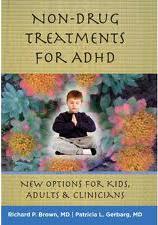 In this award-winning book, Gerbarg and Brown write as one, in a single and singular voice of compassion and understanding. They understand the frustration of parents, teachers and doctors and the pain of rejection that is common to many children with attention-deficit/hyperactivity disorder (ADHD). And they offer hope in the form of treatments other than stimulant medications. They argue that because there are many causes, no one treatment is a panacea for all who suffer. Each person is unique and may benefit from a combination of approaches. “Treatments must be strategically combined and tailored to the unique needs and sensitivities of each person,” say the authors. Brown and Gerbarg discuss in detail these multiple treatments that include herbs, supplements, exercise, mind-body practices, and neurofeedback. On the way, the provide fascinating stories about the many children and adults who have been able to moderate their symptoms and lead lives of satisfying work and family life.
In this award-winning book, Gerbarg and Brown write as one, in a single and singular voice of compassion and understanding. They understand the frustration of parents, teachers and doctors and the pain of rejection that is common to many children with attention-deficit/hyperactivity disorder (ADHD). And they offer hope in the form of treatments other than stimulant medications. They argue that because there are many causes, no one treatment is a panacea for all who suffer. Each person is unique and may benefit from a combination of approaches. “Treatments must be strategically combined and tailored to the unique needs and sensitivities of each person,” say the authors. Brown and Gerbarg discuss in detail these multiple treatments that include herbs, supplements, exercise, mind-body practices, and neurofeedback. On the way, the provide fascinating stories about the many children and adults who have been able to moderate their symptoms and lead lives of satisfying work and family life.
The book begins with a re-framing of what it means to be a person with ADHD. The authors focus on the qualities that contribute to success –“their thirst for novelty…, tremendous energy…, thinking outside the box, creativity…belief in their own talents…, willingness to take risks, courage, altruism, determination, and commitment to their own ideas and values,” and note that these very qualities can get them into trouble. Rather than tamp down or struggle to control a mind that races with ideas and a body with excess energy, the authors suggest that it be directed towards a passionate interest where increased work productivity counts or to the practice that makes an athlete or musician excel. They list scores of successful entrepreneurs, artists, writers, and politicians who likely could not sit still in class or finish a book or homework assignment. Included in the first chapter are definitions and most useful to families, tools for self-assessment and parental assessment. The chapter discusses the standard medicines and treatments, including behavioral therapy, evaluating effectiveness, limitations and unwanted effects.
The chapter on brain science is clear and accessible to lay readers—“just a taste of the science soup”—but enough to clue the reader to the current research that informs the authors’ approach. In the chapter on herbs, we learn not only what might be effective but for whom each individual herb might be of greatest use. Included is a section on the Indian science of Ayurveda that includes herbal treatments and self-applied pressure point therapy (marma). Here, the authors interview an expert on the subject and include his successful treatment approach for a 14-year-old boy with severe ADHD. Included in this chapter is a section on the benefits and safe administration of the hormone melatonin, important for sleep, the production of which can be disrupted in those with ADHD. Brain function can be enhanced by a class of natural substances called nootropics, and the authors outline these as well. Included in the chapter is a helpful chart that explains use, dosage, effects, side effects and recommended vendors.
The chapter on diet, vitamins and nutrients that can be an effective component of treatment includes foods and additives to avoid that can send a child with ADHD from rambunctious to out of control.
The chapter on mind-body practices shares anecdotal evidence from the authors’ practice and from yoga therapist and LifeForce Yoga Practitioner Joy Bennett’s work of the effectiveness of yoga and yoga breathing in helping children and adults with ADHD focus and relax. The author’s take us through a class Joy leads for boys with severe learning and behavioral problems, in which she uses breath, movement and chakra tones, as well as cues to feel “the sparkle in your hands” and other direct body sensation to help the boys attune to their bodies, increasing interoception (how the mind listens to the body) and self-regulation. This chapter not only suggests specific mind-body practices that have been shown to be helpful, but recommends ways you can introduce yoga into schools that have not in so far been receptive to its inclusion.
Every chapter has a compendium of valuable resources and the last chapter provides doctors, parents, educators and those who suspect they may have ADHD with inspiring tools to manage symptoms and channel that excess energy into the power to achieve their goals. If you know someone with ADHD or someone who lives with him or her, the gift of this book could change their lives. In today’s news: Non-Drug Treatments for ADHD just won the Independent Publishers Gold First Place award in the Psychology/Mental Health category. Congratulations Drs. Gerbarg and Brown!
Review: Calm: Choosing to Live Mindfully by Angela Buttimer and Dennis Buttimer
Reviewed by Rose Kress
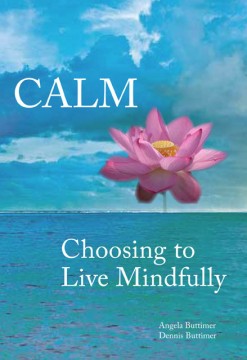 Life, work, and duty all seem to conspire to call us away from our daily practice, and we often succumb. We easily forget that 5—10—20 minutes every day is better than an hour or two a week. Calm is a wonderful reminder that less can be more. The authors point out in the introduction that they have purposefully left the chapters short so that readers can fit the practices into their hectic lives.
Life, work, and duty all seem to conspire to call us away from our daily practice, and we often succumb. We easily forget that 5—10—20 minutes every day is better than an hour or two a week. Calm is a wonderful reminder that less can be more. The authors point out in the introduction that they have purposefully left the chapters short so that readers can fit the practices into their hectic lives.
The Buttimers are students of Thich Nhat Hanh, a Buddhist Zen Master who is well known for his accessible teachings on mindfulness. The authors honor their teacher’s legacy with a book filled with accessible daily practices. Each chapter is a teaching in mindfulness that is concise, starts with an inspirational quote, and ends with Self-Reflection questions and a practice. A wonderful example of the simplicity of the practices is the first chapter, “Today is a New Day.” The authors give a short teaching on the opportunity of beginning again, each morning and then move on to illustrate the teaching with several anecdotes. The chapter ends with the practice of waking up and saying to yourself “today is a new day.”
We often work really hard at making things complicated for ourselves, thinking that the more complex something is the better it is. In reality, simplicity can be quite profound and change our lives in big ways. The practice of mindfulness is simple, often difficult in execution, but with guides like the Buttimers’, attaining and sustaining mindfulness accessible.
To order your copy: allthingsintegrative.com/online-store/calm-mindfulness-book/
Media Mention: Michele Hébert & Mehrad Nazari, Ph.D
Flute Melodies to Open the Heart by William Hébert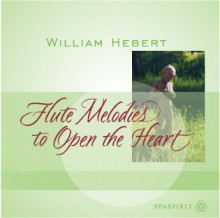
Michele Herbert has shared the gift of her father’s simple and soothing flute in this collection. Accompanied by a pianist, this CD includes peaceful songs from Satie, Debussy, Bach and Mozart as well as others. These songs will indeed open your heart.
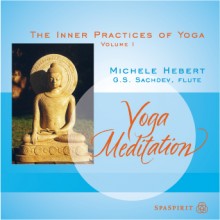 The Inner Practices of Yoga – Volume 1 by Michele Hébert
The Inner Practices of Yoga – Volume 1 by Michele Hébert
This CD begins with an introduction from Michele Herbert and then moves through Relaxation, Alternate Nostril Breath, Meditation and ends with a calming instrumental track. Michele’s instructions are easy to follow and she gives modifications where needed – perfect for beginners.
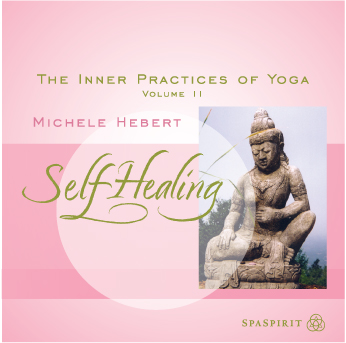 The Inner Practices of Yoga SELF HEALING – Volume 2 by Michele Hébert
The Inner Practices of Yoga SELF HEALING – Volume 2 by Michele Hébert
Michele Hébert guides you through a series of Raja Yoga practices to balance the chakras and access the healing intelligence that resides within.
The Inner Practices of Yoga – Volume 3 by Mehrad Nazari, Ph.D
Dr. Nazari begins with an introduction of yoga nidra – a practice of “connecting with our supreme 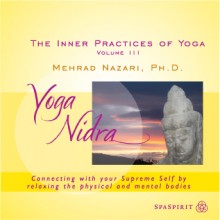 self.“ The first practice is a yoga nidra with subtle and non-distracting music in the background. The other nidra practice is without music. Both practices are a little over 30 minutes long and are both quite soothing.
self.“ The first practice is a yoga nidra with subtle and non-distracting music in the background. The other nidra practice is without music. Both practices are a little over 30 minutes long and are both quite soothing.
All four CDs can be order through Hebert and Nazari’s website: rajayogis.net/products/list
News: New Format Option for the LifeForce Yoga Practitioner Training
We’ve just introduced a new format for taking the LifeForce Yoga Practitioner Training. Three residential retreat style trainings are still available, but the new option includes three sections for certification, the first two of which can be taken independently of certification as an LFYP. The first section is a 5-day experiential retreat in the Bahamas at the Sivananda Ashram, which will be held in February 7 – 11th, 2013, the second section is an on-line long-distance learning component, and the third section is long-distance Mentoring with a LifeForce Yoga Mentor. This format is ideal for international trainees.
yogafordepression.com/practitioner-training/
News: New LifeForce Yoga Training for Anxiety and Depression (level 1 & level 2) on the East Coast
We’ve been listening to your requests and have added both a Level One and a Level Two LFYP residential training on the East Coast. You will now be able to be certified in three different residential locations in the USA: Tucson, Kripalu Center, and at the Satchidananda Ashram at Yogaville in Buckingham, Virginia. If you’re not interested in full certification, consider the shorter 15-hour CEC training at the Cape Cod Institute.
News: First LifeForce Yoga 200-hour Teacher Training
The other big news is that for the first time, senior Kripalu Yoga Teacher Trainer, Rudy Pierce, MA, E-RYT 500, known to many as “the gentle yogi,” and I will be directing a Yoga Alliance approved 200-hour residential LifeForce Yoga Teacher Training in Tucson. We hope to have more details and registration information up on the website by May 15th. Functional Yoga Therapist and Ayurveda Specialist Maria Kali Ma, RN, MS, E-RYT 500, will be a guest teacher in the training, along with LifeForce Yoga Program Manager Rose Kress, RYT 500, LFYP-2, and Kripalu teachers Jami Macarty, MFA, ACE-PT, E-RYT 500, LFYP-2, and Tom Beall, MA, E-RYT 500. The two 12-day residential sessions to complete the 200-hr training will be Nov 30 – Dec 12th, 2013 and Feb 22 – Mar 6, 2014.
yogafordepression.com/200-hour-lfy-yoga-teacher-training/
News: Drs. Richard Brown and Patricia Gerbarg -Trainings
Not have the psychopharmacist/psychiatrist team of Dr. Brown & Dr. Gerbarg authored two new books (one of which is reviewed below) that provide alternatives to medicine for much of what ails us, but they are also offering a their mind Breath~Body~Mind Teacher Training Certificate Course at Kripalu August 19-24. I am honored to have them as guest teachers in the LifeForce Yoga Practitioner Training For Anxiety and Depression offered to yoga and health professionals at Kripalu, July 6 – 13th.
News: Interview with Amy in the Huffington Post
Eva Norlyk Smith, PhD, interviewed me about using yoga practices in medical settings.
huffingtonpost.com/eva-norlyk-smith-phd/yoga-depression_b_1412506.html
To order Yoga Skills for Therapists: Effective Tools for Mood Management with a 20% discount, us this code: OAW 1955
News: New Yoga Blog for Children
LifeForce Yoga practitioner Ellen Campbell has created a fun place on the internet for children of all ages. http://youthfulyogis.blogspot.com/ offers kids instruction on poses, plus yoga-related games and general information about the origins of yoga. Encourage your kids to submit their original artwork and Ellen will post it on the blog. Youthful Yogis is actually great for adults as well, since lots of practitioners are looking for ways to share yoga with the children in their lives. And if you teach yoga to children, Youthful Yogis will be a daily source of inspiration.
Calendar Highlights
May 10
Tucson, AZ
Yoga Skills book-signing and Talk
5:30 – 6:45pm, Amy will offer simple yoga practices to manage your mood–no mat required! Free in the Rillito Room of the Tucson Racquet and Fitness Club. 4001 N Country Club Rd. Entrance to Rillito Room is free.
May 16 – May 19
Phoenix (Goodyear), AZ
FACES Conference: The Art & Science of Mindfulness – A Revolution of the Heart
Amy will offer an all-day pre-conference workshop on May 16th: Yoga Skills for Mood Management (No Mat Required).
http://facesconferences.com/index.php?main_page=product_info&cPath=1&products_id=13
May 18 – May 20
Stockbridge, MA
LifeForce Yoga and Addictions
LifeForce Yoga Meets the Hungry Ghost with addictions specialist Dr. Kathy Shafer www.funtherapist.com, 800-741-7353
yogafordepression.com/events/lifeforce-yoga-and-addictions/
Jun 22 – Jun 24
Big Sur, CA
LifeForce Yoga to Manage Your Mood
Esalen, 888-837-2536
LifeForce Yoga® interweaves the power of an ancient discipline with current scientific findings to help you release what’s no longer serving you—without a story attached!
yogafordepression.com/events/lifeforce-yoga-manage-your-mood/
Jul 6 – Jul 13
Stockbridge, MA
LifeForce Yoga Practitioner Training For Depression & Anxiety – Level 1
Kripalu Center, 800-741-7353. This is a certification training for yoga teachers and health professionals. Joining Amy as faculty are Patricia Gerbarg, MD and Richard Brown, MD, authors of How to Use Herbs, Nutrients and Yoga for Mental Health Care and LifeForce Yoga Practitioners -Level 2, who are highly trained yoga and/or mental health professionals.
kripalu.org/program/view/LFYD-121
Jul 15 – Jul 16
Stoney Creek, ON, Canada
LifeForce Yoga: Effective Practices for Mood Management
Heaven Studio, 888.465.2726
In this inspiring workshop, you will learn and practice breathing exercises, easy postures, guided meditations, and other effective yoga practices not regularly taught in yoga class for managing mood.
heavenstudio.ca/index.php?option=com_content&view=article&id=54
Jul 20 – Jul 22
Rhinebeck, NY
LifeForce Yoga to Manage Your Mood
Omega Institute, 877-944-2002. In this inspiring workshop, you will learn and practice breathing exercises, easy postures, guided meditations, and other experiential yogic tools for managing your mood.
yogafordepression.com/events/lifeforce-yoga-manage-your-mood/
Jul 22 – Jul 27
Rhinebeck, NY
LifeForce Yoga & Internal Family Systems with Dick Schwartz, Ph.D.
for the first time Internal Family Systems (IFS) creator Dick Schwartz, Ph.D., and Amy who is trained as a Level 2 IFS practitioner are teaming up to offer a week of working with all your parts and yoga for your mood. Omega Institute, 877-944-2002.
yogafordepression.com/events/lifeforce-yoga-meets-your-internal-family-system/